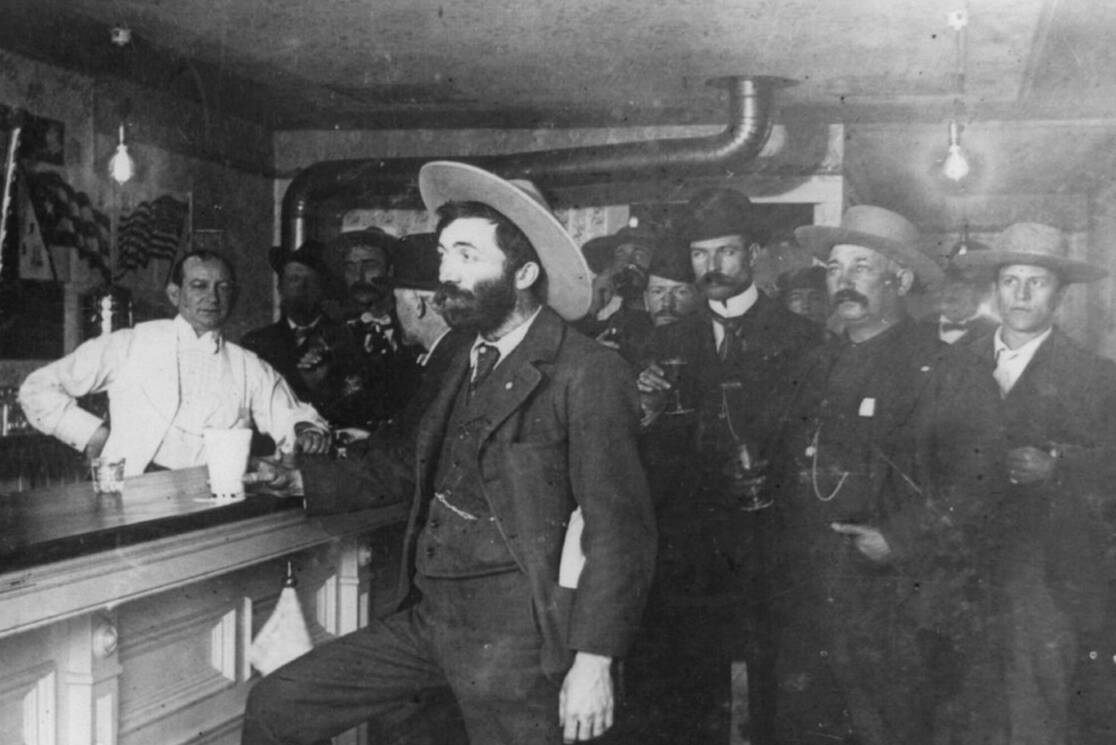I recently spent a rainy Sunday afternoon in the Gold Rush cemetery in Skagway, wandering behind tour guides who reenacted Skagway’s most famous story: the shoot-out that ended the reign of terror — and the life — of the notorious con man Jefferson Randolph “Soapy” Smith. Thousands of gold seekers who poured through town on their way to the Klondike fell victim to the many scams and schemes that Soapy had perfected during his long criminal career in the American West. Upon his death, the Skagway townspeople erected a monument to the man credited with shooting him, Frank Reid, who perished from injuries sustained in the same gunfight. “He gave his life for the honor of Skagway,” is etched in the stone.
I had hoped my visit to the cemetery might offer me time for peaceful contemplation. Instead, it got me thinking about how little the con man’s playbook has changed in the last 125 years. A con man “cheats or tricks someone by gaining their trust and persuading them to believe something that is not true.” From Soapy’s many exploits, 10 guiding principles for becoming a successful con man emerge, which have obviously stood the test of time.
(1) Charm, charm, charm. No con man can survive long without good social skills. According to one news reporter of the day, Soapy was “the most gracious, kind-hearted man I’ve ever met.” How else could he have convinced the miners of Skagway to pay handsome fees to send telegraph messages to the folks back home on his nonexistent telegraph line?
(2) Be boldly visible with your wealth and presence. If you plan to have good cover for crooked enterprises, embrace the hospitality industry and make sure your name appears on buildings. What real criminal would want to broadcast his name? Soapy chose “Jeff Smith’s Parlor” for the saloon that became his center of activity, viewed by many as Skagway’s “real city hall.”
(3) Wrap yourself in the flag. When considering the limitless corruption possibilities around you, remember to seize every opportunity to display your love for your country. Soapy made sure to cloak his saloon in red, white and blue on every patriotic occasion. He also convinced President McKinley to recognize his all-volunteer “Skagway Military Company” as a component of the U.S. military.
(4) Never miss an opportunity to draw attention to yourself. Soapy persuaded the town authorities to include him as a marshal in the 1898 Skagway July 4th parade. But according to Skagway legend, he wasn’t satisfied with being just one of the marshals; he wanted to be the Grand Marshal. When organizers placed him and his contingent at the rear of the floats and marchers, he allegedly turned his horse around at the end and led the procession back through town, tipping his hat and pausing frequently for his troops to display their maneuvers, to the crowd’s delight.
(5) Donate generously to churches and charities. Soapy supported institutions and causes favored by pillars of the community, no doubt hoping to ingratiate himself with those in power so they wouldn’t look too closely at his affairs. Ultimately, his funeral was held in a church that he helped fund.
(6) Reward the loyal. Townspeople loyal to Soapy were willing to turn a blind eye to his crimes in exchange for praise, protection and cash. Payoffs and bribes flowed freely from his coffers and the beneficiaries remained silent because they liked what he delivered. It helped that Skagway’s sheriff was himself on Soapy’s payroll.
(7) Destroy the disloyal. People with the audacity to speak up about Soapy’s activities faced threats that gave them pause because his reputation for settling scores was legendary. In Colorado, he once brutally beat a newspaperman, fracturing his skull, after he published stories connecting Soapy to criminal enterprises.
(8) When accused of wrongdoing, deny everything. Soapy always denied every accusation against him, however big or small. Charges of cheating, theft, violence – even murder. In the rough and tumble frontier towns of the West, his indignant denials were usually enough to hold the heat of the law at bay.
(9) When the law catches up to you, attack the law. When the U.S. Commissioner of nearby Dyea, whose allegiance could not be bought, summoned Soapy to return gold stolen by his men, Soapy replied that he would “cut the damned ears off” any of his men who returned the gold because it had been taken fair and square in a shell game.
(10) Embrace violence to hold power. Soapy was willing to spearhead violence – even insurrection – when he couldn’t bend events to his will. He once led an armed revolt against a Colorado state militia when it attempted to remove corrupt officials from Denver’s city ranks. In Skagway, his final act was to bring his rifle to a gathering of the vigilante group determined to drive him out of town, and to level it at Frank Reid.
Watching the flamboyant tour guides perform Soapy’s story with laughter and fanfare, I found myself wondering how anyone could miss the signs that repeat themselves as insidiously and destructively today as they did 125 years ago. Charm dripping towards eager suppliants, incessant demands for attention, and rallies wrapped in red, white and blue. Conscience-free lies, schemes and scams, and steadfast refusals to retract falsehoods or refute evidence of wrongdoing. Largesse for those willing to guard him against moral, ethical and legal accountability, and hostile attacks on those willing to speak truth. Condemnation of laws he willfully breaks, and incitement of violence at the threat of justice being served.
This Fourth of July, our nation confronts a con man whose success and power have surpassed Soapy Smith’s wildest dreams. The questions that haunt me from that rainy day in the cemetery: Who will Americans celebrate 125 years from now – the con man or those who tried to stop him? And who, in the end, will get the monument?
• Barbara Hood is a resident of Anchorage.

